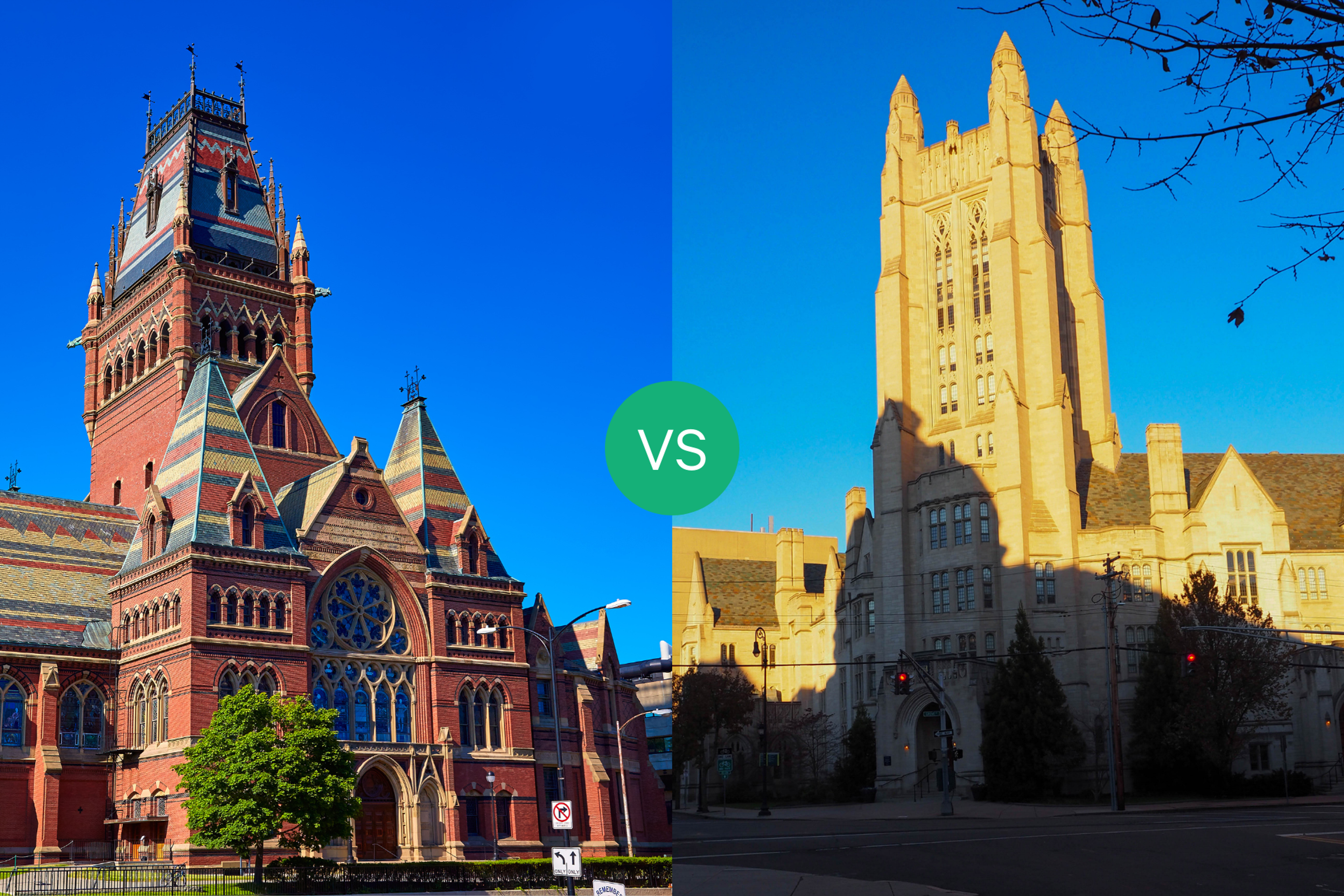Yale Law School Vs. Duke University School of Law: An In-Depth Comparison
Are you considering law school and wondering which institution to choose? Our article provides an in-depth comparison between Yale Law School and Duke University School of Law, covering everything from curriculum to campus culture.
Posted March 6, 2025

Table of Contents
When it comes to choosing the right law school, it's essential to consider all your options and make an informed decision. Two of the most prestigious law schools in the United States are Yale Law School and Duke University School of Law. In this article, we'll take an in-depth look at the similarities and differences between these two institutions, so you can make a more informed decision about which one to attend.
Introduction to Yale Law School and Duke University School of Law
Yale Law School is a renowned institution located on the Yale University campus in New Haven, Connecticut. Founded in 1824, it is one of the oldest law schools in the US and is known for its rigorous academic program and focus on public service. Duke University School of Law, on the other hand, is located in Durham, North Carolina. It was founded in 1930 and is well-known for its strong programs in environmental and international law, as well as its commitment to promoting diversity and inclusion.
Yale Law School has a distinguished faculty that includes many prominent legal scholars and practitioners. The school also offers a wide range of clinics and programs that allow students to gain practical experience in various areas of law, such as the Jerome N. Frank Legal Services Organization, which provides free legal services to low-income clients.
Duke University School of Law has a strong emphasis on interdisciplinary studies, with opportunities for students to take courses in other departments at Duke University, such as the Fuqua School of Business or the Sanford School of Public Policy. The school also has a robust network of alumni, who are leaders in various fields of law and beyond, providing students with valuable connections and career opportunities.
History and Background of Yale Law School
Yale Law School has a rich history that dates back more than 200 years. It was founded in 1824 by Judge Seth P. Staples, who was the first law lecturer at Yale University. The school has graduated numerous notable alumni over the years, including former US Presidents Gerald Ford and Bill Clinton, among others.
One of the unique features of Yale Law School is its commitment to public interest law. The school has a strong tradition of producing lawyers who go on to work in public service, including in government agencies, non-profit organizations, and advocacy groups. In fact, Yale Law School has been ranked as the top law school for public interest law by the National Jurist magazine.
Another notable aspect of Yale Law School is its emphasis on interdisciplinary study. The school encourages students to take courses in other departments at Yale University, such as political science, economics, and philosophy, in order to gain a broader understanding of the law and its impact on society. This interdisciplinary approach has helped to shape the school's reputation as a leader in legal scholarship and research.
History and Background of Duke University School of Law
Duke University School of Law was founded by James B. Duke in 1930. It quickly gained a reputation as one of the leading law schools in the country, thanks to its innovative curriculum and strong commitment to community engagement and experiential learning. Today, the school has more than 640 students and offers an impressive array of courses in diverse legal fields.
In addition to its academic offerings, Duke Law is also known for its commitment to public service. The school's Pro Bono Program provides students with opportunities to work on legal projects for underserved communities, while the Duke Law Innocence Project works to exonerate wrongfully convicted individuals. The school also has a strong tradition of producing leaders in the legal profession, with alumni including U.S. Supreme Court Justice Samuel Alito and former U.S. Attorney General Loretta Lynch.
Admission Criteria for Yale Law School and Duke University School of Law
Both Yale Law School and Duke University School of Law are highly selective institutions that receive thousands of applications each year. To be considered for admission, applicants must have excellent academic credentials, including high GPAs and LSAT scores.
At Yale Law School, admission is based on a comprehensive review process that takes into account a range of factors, including academic ability, extracurricular activities, letters of recommendation, and work experience. Similarly, Duke Law School evaluates applicants based on a holistic admissions process that looks beyond grades and test scores to assess an applicant's potential as a future lawyer.
Application Process for Yale Law School and Duke University School of Law
The application process for both Yale Law School and Duke University School of Law is rigorous and time-consuming. To apply, prospective students must submit an extensive application that includes their academic transcripts, LSAT scores, letters of recommendation, personal statements, and any additional materials required by the school.
At Yale Law School, the application process also includes an interview with a member of the admissions committee, while Duke University School of Law offers applicants the opportunity to submit a video essay that showcases their communication and analytical skills.
Curriculum Comparison: Yale Law School vs. Duke University School of Law
Both Yale Law School and Duke University School of Law offer comprehensive legal education programs that cover a broad range of legal topics. At Yale Law School, students are required to take a core curriculum that includes courses in constitutional law, contracts, criminal law, property law, and torts. At Duke University School of Law, students are also required to take a set of core courses, which include civil procedure, contracts, property law, and torts. However, Duke Law School also offers a wide range of specialized courses in areas like environmental law, international law, and intellectual property law, among others.
Faculty at Yale Law School vs. Duke University School of Law: A Comparative Study
Yale Law School and Duke University School of Law both have highly respected faculty members who are experts in their respective fields. At Yale Law School, the faculty includes more than 70 full-time professors, many of whom have played significant roles in shaping legal policy, scholarship, and practice. Similarly, Duke University School of Law has a faculty of more than 60 full-time professors who are dedicated to advancing the study and practice of law through teaching, research, and public service.
Campus Life at Yale Law School vs. Duke University School of Law: A Comprehensive Overview
While academics are undoubtedly the main focus of any law school experience, campus life also plays an essential role in shaping students' overall experience. At Yale Law School, students can take advantage of a wide range of extracurricular activities and student organizations, including law journals, moot court competitions, and public interest and community service groups. Similarly, Duke University School of Law offers a vibrant campus life, with over 40 student-run organizations and groups, including a student bar association and academic and social clubs.
Housing Options for Students at Yale Law School and Duke University School of Law
Both Yale Law School and Duke University School of Law offer a range of housing options to students. At Yale Law School, students can choose to live on-campus in one of three residence halls, which offer convenient access to classrooms, libraries, and other campus resources. Alternatively, students may opt to live off-campus in nearby apartments or rental homes. Similarly, Duke Law School offers a range of housing options, including on-campus apartments and townhouses, as well as off-campus rental options in the surrounding Durham area.
Cost Comparison: Studying in Yale Law School vs. Duke University School of Law
When it comes to cost, both Yale Law School and Duke University School of Law are expensive institutions. Tuition and fees at Yale Law School for the 2020-21 academic year were $66,128, while Duke University School of Law charged $67,152 for the same year. In addition to tuition, students should also budget for living and housing expenses, books, and other supplies. While both schools offer financial aid programs to help offset the cost of attendance, students should be prepared for a significant financial commitment if they choose to attend either institution.
Employment Opportunities After Graduating from Yale Law School or Duke University School of Law
One of the most critical factors to consider when choosing a law school is the employment prospects after graduation. Both Yale Law School and Duke University School of Law have strong track records when it comes to placing graduates in top legal jobs. According to recent employment statistics, over 85% of graduates from both schools found employment within 10 months of graduating. Most graduates went on to pursue careers in private law firms, while others chose to work in public interest or government jobs.
Alumni Network Comparison: Yale vs. Duke
Both Yale Law School and Duke University School of Law have extensive alumni networks that can offer valuable resources and support to graduates throughout their legal careers. Yale Law School has produced a long list of influential alumni, including Supreme Court justices, US presidents, and prominent legal scholars and practitioners. Similarly, Duke University School of Law has an active alumni community that offers networking opportunities, mentorship programs, and other professional development resources.
Student Activities Available at Both Schools
Both Yale Law School and Duke University School of Law offer a wide range of student activities and extracurricular opportunities that can enhance students' legal education and personal growth. At Yale Law School, students can get involved in various clinics, including the Immigration Legal Services Clinic and the International Human Rights Clinic. Duke Law School offers similar opportunities for experiential learning, with 10 clinical programs focused on areas like civil justice, environmental law, and community enterprise.
Extracurricular Opportunities Available for Students at Both Schools
In addition to clinical programs, both Yale Law School and Duke University School of Law offer a range of extracurricular opportunities for students to explore their interests outside of the classroom. At Yale Law School, students can participate in a range of activities, from law journals and moot court competitions to student-run affinity groups and social events. Duke Law School also offers a range of extracurricular opportunities, including a trial advocacy program, law journals, and student-led initiatives focused on legal innovation and social justice.
Student Feedback and Testimonials on their Experience at Both Schools
Finally, it's essential to consider student feedback and testimonials when evaluating law schools. Both Yale Law School and Duke University School of Law have received high praise from current and former students, who laud the schools' outstanding academic programs, supportive faculty, and strong reputation in the legal community.
Conclusion: Which is the Better Choice - Yale or Duke?
Choosing between Yale Law School and Duke University School of Law ultimately comes down to your individual preferences, career goals, and priorities. Both schools offer excellent legal education programs, renowned faculty, extensive extracurricular opportunities, and a strong alumni network. Consider your personal needs and preferences carefully, and do your research to determine which school is the best fit for you.











